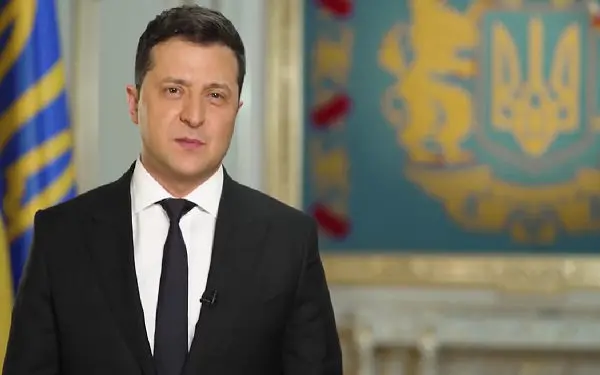Amid US warnings of a possible imminent invasion of his country by Russian troops, Ukrainian President Volodymyr Zelensky has declared Feb. 16 a day of unity by decree, news agency MIA informs.
The US government recently warned that it considered a Russian invasion possible before the end of the Winter Olympics in China on Feb. 20. According to media reports, US intelligence information mentioned Feb. 16 as a possible date for Russian military action.
“We are told that Feb. 16 will be the day of the invasion, we will make it the day of unity,” Zelensky said in a video on Monday evening. Ukrainians are expected to raise flags across the country and sing the anthem at 10 am (0800 GMT). “Let’s show the whole world our unity,” the 44-year-old leader said.
In his speech, Zelensky again rejected Russian accusations that Ukraine was making preparations for an offensive against the breakaway territories of Luhansk and Donetsk in eastern Ukraine, collectively known as Donbas. “The Donbas and Crimea will return to Ukraine exclusively through diplomatic channels,” the president stressed.
Russia had annexed the Crimean peninsula on the Black Sea in 2014 and subsequently also supported the pro-Moscow separatists in eastern Ukraine. The speech came as the US announced that it was moving its embassy operations from the capital Kyiv to the city of Lviv near the border with Poland. US Secretary of State Antony Blinken called it a temporary precautionary measure. “The embassy will remain engaged with the Ukrainian government, coordinating diplomatic engagement in Ukraine,” he said.
“We are also continuing our intensive diplomatic efforts to deescalate the crisis,” he added. “Our commitment to Ukraine’s sovereignty and territorial integrity is unwavering.” Zelensky had earlier criticized the recent relocation of some embassy staff during a press conference with German Chancellor Olaf Scholz in Kyiv: “It is a big mistake that some embassies are moving to Western Ukraine, because there is no Western Ukraine, there is Ukraine.”
“If, God forbid, something happens, it will be everywhere,” Zelensky said. Large-scale Russian military exercises were being held off the southern coast of Ukraine on Monday, with aircraft, helicopters and more than 30 warships gathering in the Black Sea.
Russia says the training is aimed at locating and destroying submarines. Ukraine calls the drills, which are expected to last through Saturday, a provocation that will severely impede navigation in the Black Sea and the adjacent Sea of Azov. The Kremlin has rejected accusations that merchant ships would be impacted by the maneuvers and said they pose no security threat.
Nevertheless, Ukraine has advised airlines to avoid airspace over the area. The naval exercises are overlapping with large-scale military drills under way between Russia and and its close ally Belarus, which shares a border with Ukraine. The US says there are 130,000 troops amassed on Russian territory near the border, meaning Russian forces are built up on three sides of Ukraine.
The US and its NATO allies charge that Russia is preparing a renewed attack on Ukraine, following the 2014 annexation of the Black Sea peninsula of Crimea, an accusation that Russia rejects and calls “scaremongering.” Top US officials said in recent days that intelligence suggests Russia could be planning to invade Ukraine “at any time,” including before Feb. 20.
Belarusian leader Alexander Lukashenko said on Monday that the decision to stage the joint exercises with Russia was made before the current “hysteria” had broken out. On the question of when Russian troops would leave Belarus again, he said: “We will decide that with Vladimir Putin.”
The West fears that troops will not leave Belarus once the 10-day drills, which started late last week, conclude. According to the Kremlin, Putin is scheduled to talk to Lukashenko sometime this week. Previously, the Kremlin had made statements that Russian troops would be withdrawn. Russian Foreign Minister Sergei Lavrov has advised President Vladimir Putin to continue negotiations with NATO on security guarantees.
“There is always a chance,” Lavrov said he told Putin. But they can not drag on indefinitely, he said. Blinken stressed in comments to France24 Monday that “the path to diplomacy remains open.”
“We’re doing everything we possibly can to convince Russia that it should take the diplomatic path, the path of dialogue to resolve whatever differences exist peacefully,” he said.
Finance ministers from the Group of Seven (G7) nations said on Monday they are prepared to impose “massive” economic sanctions on Russia should it attack Ukraine.
Western leaders have been scrambling to defuse the crisis but their conversations with Putin — including US President Joe Biden’s on Saturday — have failed to make progress.

















